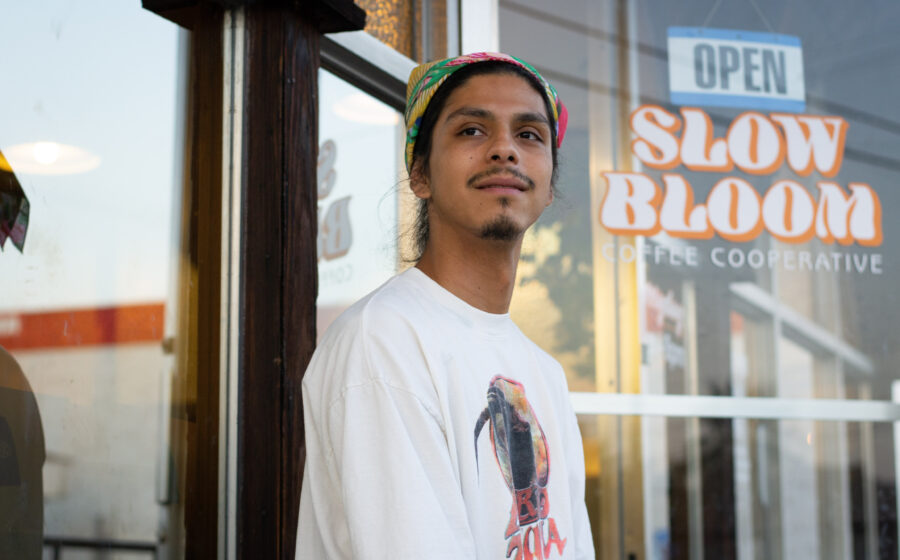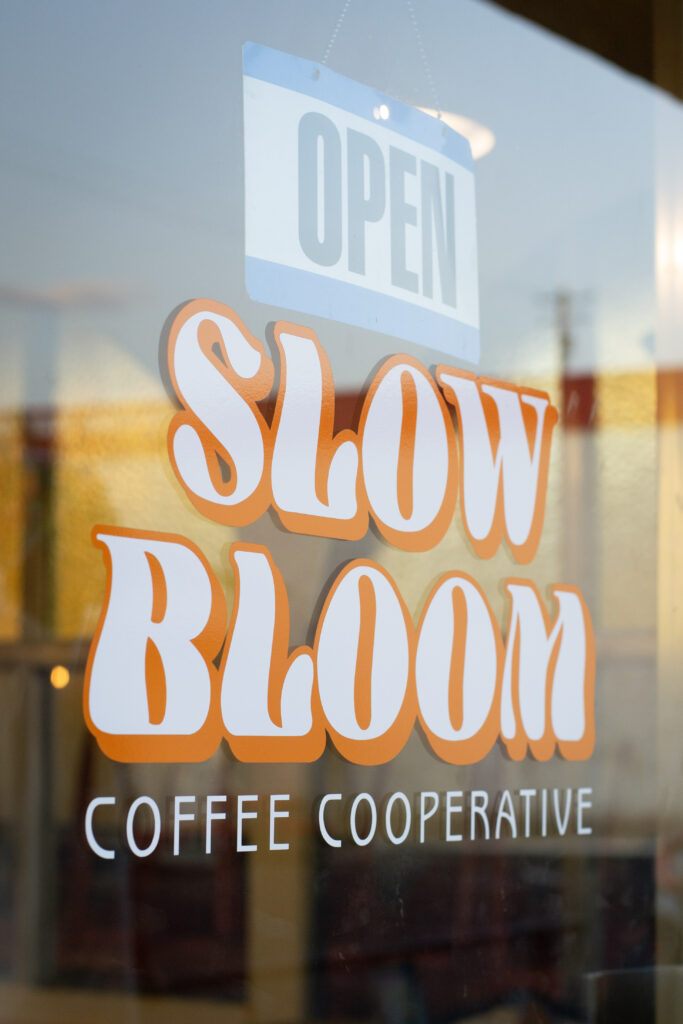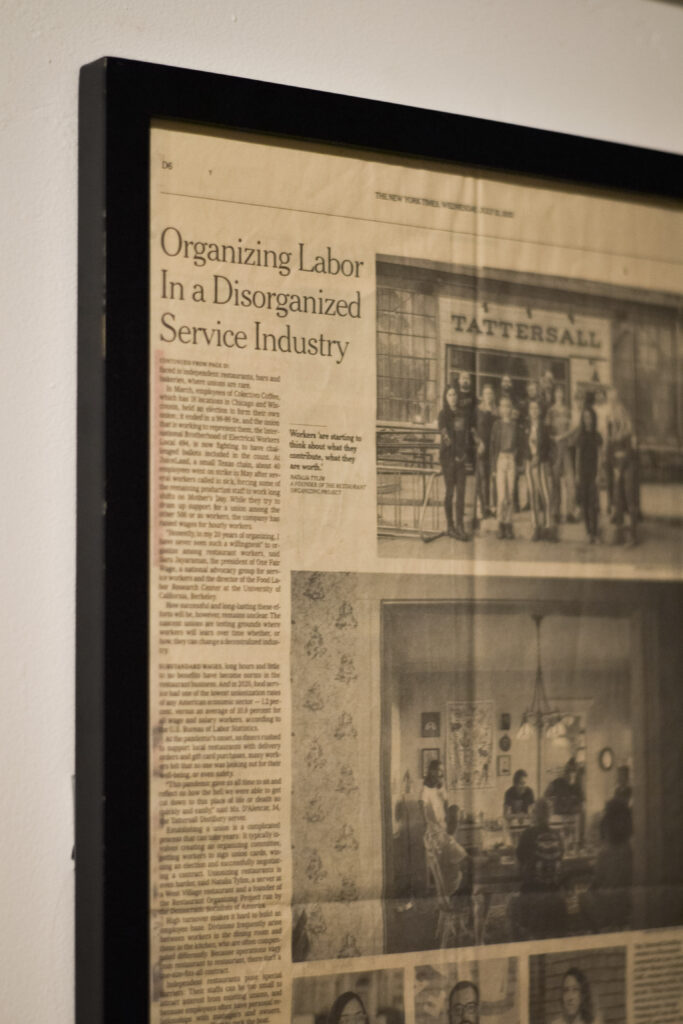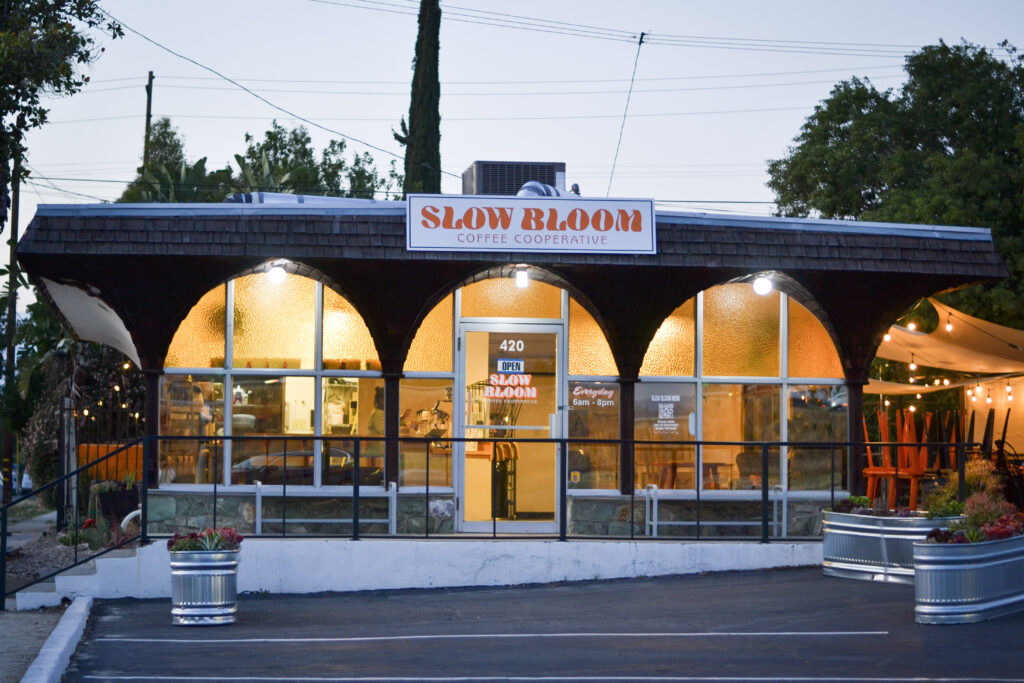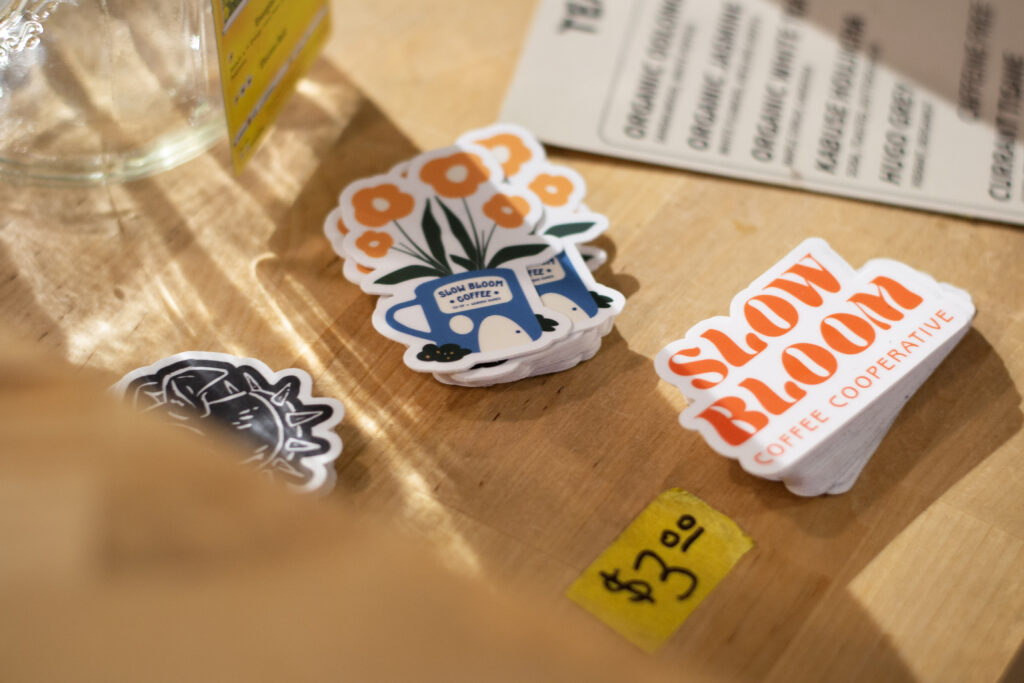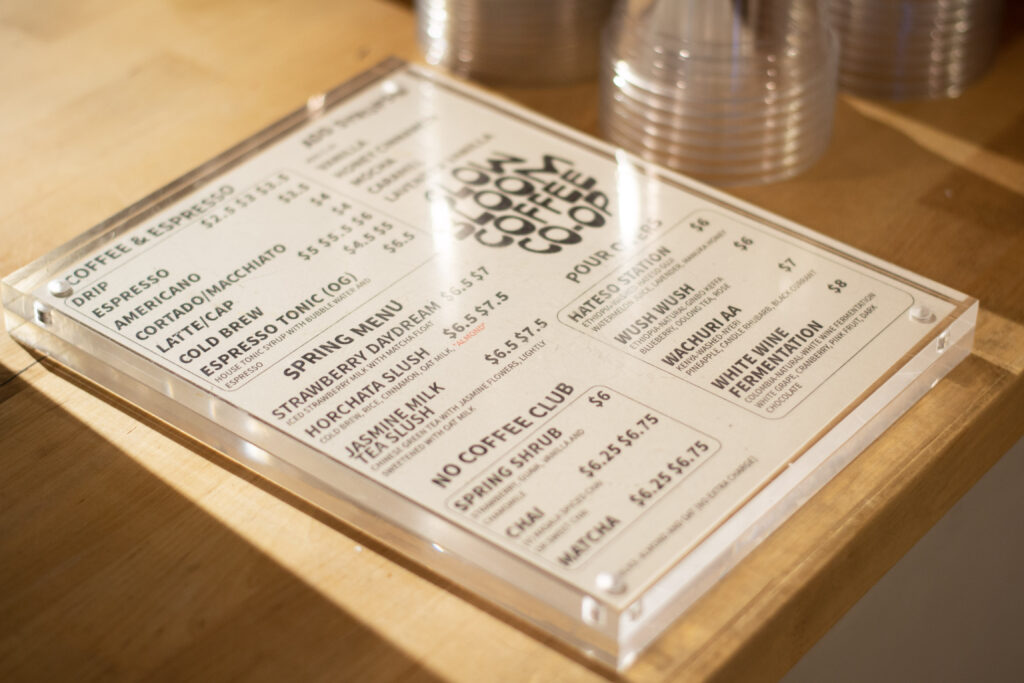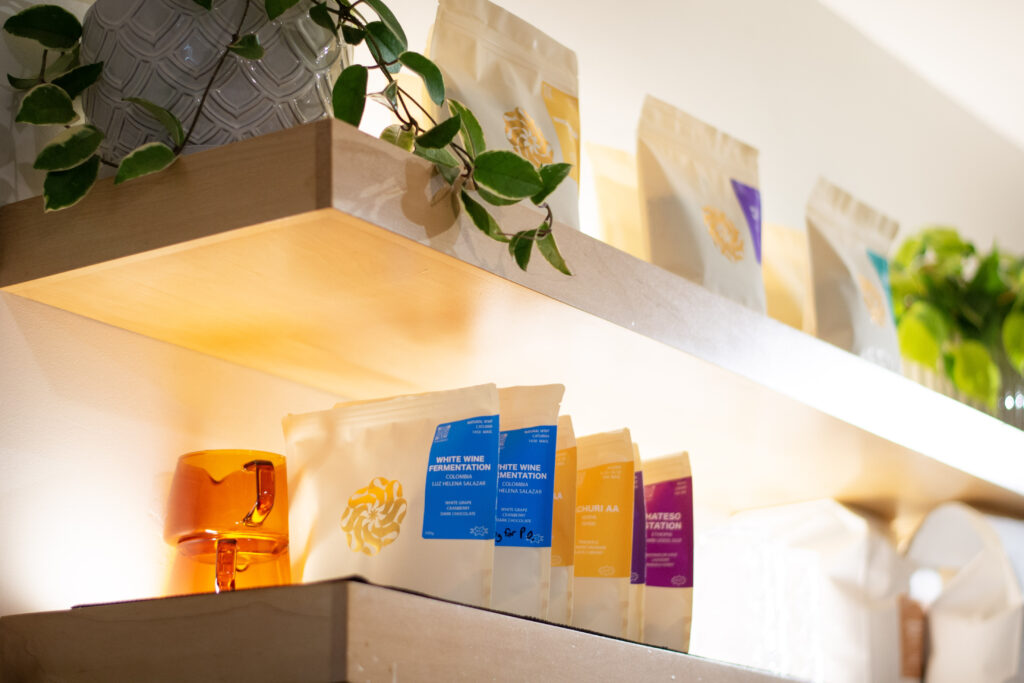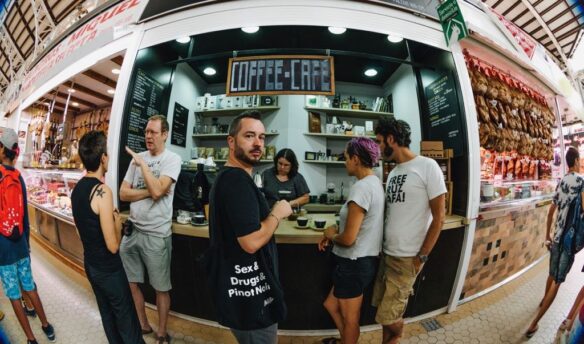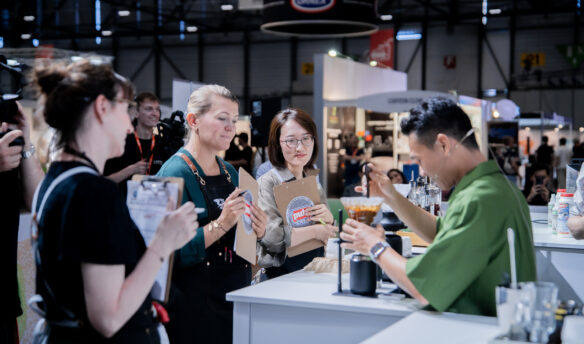Photos by Sadie Scott
When entering Slow Bloom Coffee Cooperative, customers walk through a glass door under a window in the shape of a half-circle with a yellow tint. Adding to the warm and tranquil ambiance inside the café, located in Redlands, California, a glittering disco ball rotates as it dangles from the ceiling a few feet from the back door, reflecting specs of light directed at it.
Toward the back of the building, past a counter extending out from a cordoned-off kitchen area, framed newspaper clippings from national publications like The New York Times and Los Angeles Times adorn the wall, encircling the decorative Slow Bloom insignia.
The framed cutouts memorialize the early beginnings of Slow Bloom. The Slow Bloom Coffee Cooperative was formed after workers at Augie’s Coffee, a former Redlands-based roaster, announced their intent to unionize in 2020. Weeks later, on July 4, 2020, Augie’s announced it would close its five locations throughout Southern California’s Inland Empire and lay off 54 employees, citing pandemic-related profit loss as the deciding factor.
But workers, who had just notified ownership the week before they wanted to affiliate with the United Electrical, Radio & Machine Workers of America (UE), considered the shuttering retaliation for union organizing. After an investigation, the National Labor Relations Board agreed with the laid-off workers, issuing a formal complaint that “Augie’s Coffee illegally terminated over 50 employees in retaliation for union organizing,” a UE press release states.
Augie’s retail locations never re-opened, but that’s just the beginning of the story of Slow Bloom. Amidst struggle and strife, the organizing baristas decided to take matters into their own hands and start something new.
A Slowly Blooming Worker-Owned Co-op
Instead of calling it quits after Augie’s closed, some of the baristas that had worked together to organize began imagining what their own coffee business could look like—one with a mission of shared governance and worker solidarity.
“We decided to just keep going because we love coffee,” said Jina Edwards, a former Augie’s employee and the current vice president of Slow Bloom’s cooperative board. “We didn’t want to lose coffee due to this. The baristas began small. “We started having pop-ups,” says Edwards. “Most of the pop-ups were at this place called The Artlands because I am on the board there, so I was able to use the space. So every Saturday and Sunday, we would just bring stuff to make pour overs and cold brew lattes.”
Along with pop-ups, they also roasted and sold coffee online and rolled out a fundraiser to help get the business off the ground.
A Redlands-based coffee lover and realtor helped them find a space, formerly a glass shop that relocated to Nevada. After taking out a loan from the cooperative association Shared Capital, they went to work building Slow Bloom, quite literally. Between finishing graduate school, the current president of the co-op’s board, Kelley Bader, and a few others were in the space about every day doing the framing and hanging drywall.
“We really did it all ourselves,” he said. The process took just over a year.
Before opening in March 2022, the 15-person crew had to make another key decision.
“We were looking at business models where everyone involved could be equal and not have an overlord boss telling you what to do,” Edwards said. “So a co-op fits that model for us—because we’re all even, we all own the same amount [of the business]. We have titles. But everybody gets one vote.”
Cooperative Decision-Making
Slow Bloom employees collectively make all the major decisions for the shop at meetings on the first Monday of every month. They vote on matters like wage increases—everyone earns the same wage, about six dollars more per hour than most earned at Augie’s—how many people work a given shift, and who sits on the three-person board of directors.
“Decisions about spending below a certain amount, if it doesn’t hit the ceiling cap, it’s usually just made by the executive board,” said Bader, who also works as a roaster at the co-op. “The executive board makes a lot of decisions that people don’t typically want to be bothered with.”
When it comes to what type of paper cup they carry, he said, most are fine delegating that decision-making. Unlike conventionally run enterprises, however, the cooperative structure enables those who do the work to participate in the decisions that affect and matter most to them.
The barista owners at Slow Bloom also benefit from profit-sharing at the end of every quarter. Along with their hourly wages, they distribute profits amongst themselves based on the number of hours worked.
Union Solidarity
Although many employee-owned cooperative businesses exist, the workers at Slow Bloom are also unionized through the UE, the member-run labor union that helped with the campaign at Augie’s.
They decided to stick with the union.
“The union staffers really brought us through our drive,” Bader said, before underscoring: “They stayed involved just to see us through … They just did all this work for us because they believed in us. There’s just an ethic that I want to keep intact with Slow Bloom.”
Matthew Soliz is a field organizer with the UE who also worked at Augie’s for several months before the shutdown and says that union membership ties Slow Bloom to the union’s ethics and values. “We have real democracy,” he said. “We have the bedrock UE ideals kind of built into the co-op through our membership.”
Soliz said they believe in the labor movement more broadly and want workers across the country to organize.
“We want to participate in that,” he said. “The reason we’re still a part of the union, the reason why it’s worth it for our workers to pay union dues, is because we want to participate. We get to go vote in the national union body. We have delegates. We have real democratic representation there.”
In the early days after the cooperative opened, Edwards says that people occasionally visited the shop to voice anti-union opinions. Yet, Slow Bloom has built a loyal customer base buoyed by organized labor and excited to show support while enjoying their coffee. “[We] get more union people coming in,” Edwards said, “and they’re excited to see that we’re a union coffee shop.”
Bader hopes that employees at other local businesses will be inspired by Slow Bloom and consider organizing.
“I would like to see other workers in our city join the union, and they can negotiate with their boss through our local [union chapter],” he said.
The Difference a Union Co-op Makes
Slow Bloom leads by example. On the surface, the job and the business resemble most traditional coffee shops. But the union co-op model affords a palpably different experience—for those who brew the coffee and for those who drink it.
“I definitely feel coming into a shift, it’s really nice not having someone looking over your shoulder,” Edwards said. “It’s nice not feeling like when your boss is there, you have to work harder—or they make you work harder. It’s more autonomous. It’s more welcoming. It’s more peaceful. I feel less stressed when I’m here, just working with people on the same playing field. We all have the same skin in the game. We all drive the ship forward in the same direction instead of one person on top, reaping the benefits of all of our hard work.”
The workers who run Slow Bloom want the co-op to be a community space too. The cooperative has hosted several events, and the space has ample seating outside to accommodate ongoing collaborative efforts.
Licensed vendors without a restaurant have made food on the premises, and artisans selling items like homemade jewelry semi-regularly display their wares at the café. Local bands, used book pop-ups, and a free market where people can pick up or donate clothes and toiletries have all become regular features of the Slow Bloom scene.
Serving Up Something Special
Slow Bloom is still a coffee shop; someone who walks through the door under that yellow-tinted window won’t be left wanting for quality coffee.
In addition to pour overs, menu items like caramel lattes satisfy customer sugar cravings. There’s also plenty on offer for the more adventurous to enjoy, including a selection of single-origin coffees available in retail bags in-store and online. “Nobody else in town really serves some of the funky … fruity, fermented coffees that we do,” Bader said.
Edwards recommends the honey cinnamon latte as well as their vanilla latte. Slow Bloom makes all their syrups in-house without any artificial sweeteners—and aside from the honey option, all are free from animal products.
“We focus in an extreme way on where we source all of our ingredients from,” says Edwards. “We want to give you the best value for your money.” To that point, there’s no upcharge for plant-based milk options like oat milk.
Emboldened by the experience of brewing coffee without answering to a boss, the workers at Slow Bloom are optimistic about the future of the business. They intend to expand offerings soon, but they’re also thinking bigger: the horizon of possibilities bursts open when baristas take the business of coffee into their own hands.
“This is the beginning for us,” Edwards said. “We’re still learning as we go. So, yeah, just rock with us, see what happens.”



